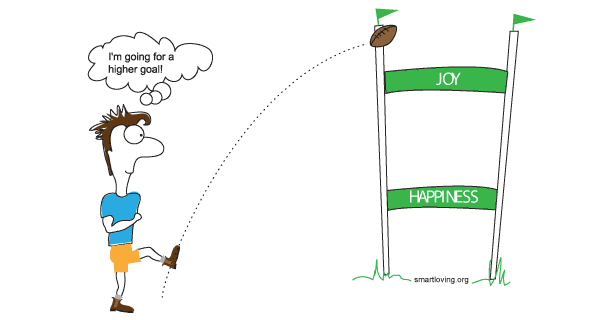What is Happiness Anyway?
Part 4 in the Quest for Happiness Series
Speaking of what makes a wife or husband happy (see SmartLoving The Equality Myth, What Women Really Want & What do Men Want?) perhaps we should look at what happiness is and more importantly, whether it really is the ultimate goal.
‘Happiness’ should be distinguished from ‘joy’.
Happiness can be defined as the feeling of pleasure when a need or desire is met. Unhappiness results when we expect that need or desire to be met, and it isn’t. Happiness is a superficial, fleeting emotion. It fades quickly unless the need or desire is met again and again.
Joy on the other hand, is a deep seated attitudinal emotion. It is associated with spiritual values and is more lasting than happiness. The joyful person knows their value and goodness and remains positive about their life even in the face of great suffering. It is possible to be unhappy and joyful at the same time.
Too many people, including married couples and parents, focus on happiness rather than joy.
We focus on satisfying the superficial desires and overlook the deeper longings of the heart. An obvious example is the parent who caves in and buys their child a new toy, when really what the child desires is more attention and time.
Attention and time (in other words, love) gives a child (or a spouse) a sense of their value, of their inestimable worth. It develops within them an attitude, a certain perspective that sees and experiences life as a privilege.
We say, ‘we just want our children/spouse to be happy’, but happiness really is a very low goal. Rather, aim for joy: a lasting and empowering perspective that gives us meaning and fulfillment that endures.





A great article, I really enjoyed reading it. Thx
This is a very timely topic capable of exploring the deepest human needs Juxtaposed with the tendency to apply quick fixes to fleeting wants. In the course offered at Berkley Uni ,The Science of Happiness, the latter is defined much more broadly as comprising if physical, mental and spiritual wellbeing, so much more whole-person related than the definition upon which you base your exploration of the difference between happiness and joy. So far through the course the picture emerges that supportive , sustained relationships are the one critical difference that make people happier, healthier and live longer (not just have the fleeting feeling of happiness). Another notable finding of research In the area of positive psychology is that happier people are more likely to be kind, compassionate and empathetic. Interestingly researchers in this area are quick to point out that pursuit of happiness for its own sake, eg of the fleeting feelings of elation, can actually lead to disappointment and be counterproductive.
Sounds like a great course Ewa. The science of happiness is an emerging field and studies are very illuminating – unfortunately, much of the popularisation of the science reduces these brilliant insights to feel-good soundbites. Wish more would do the indepth study that you are doing.